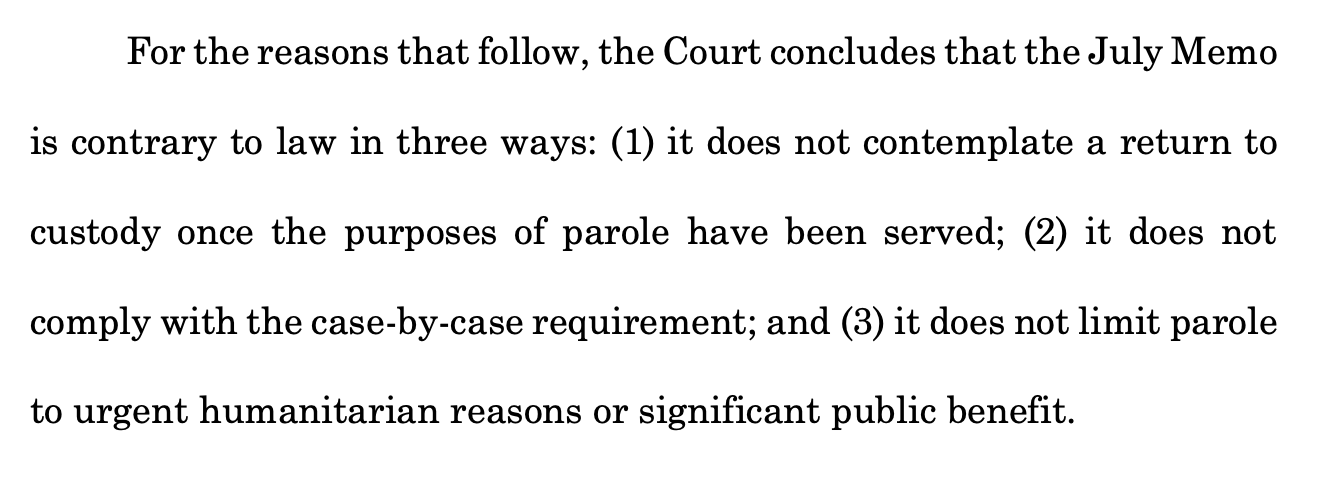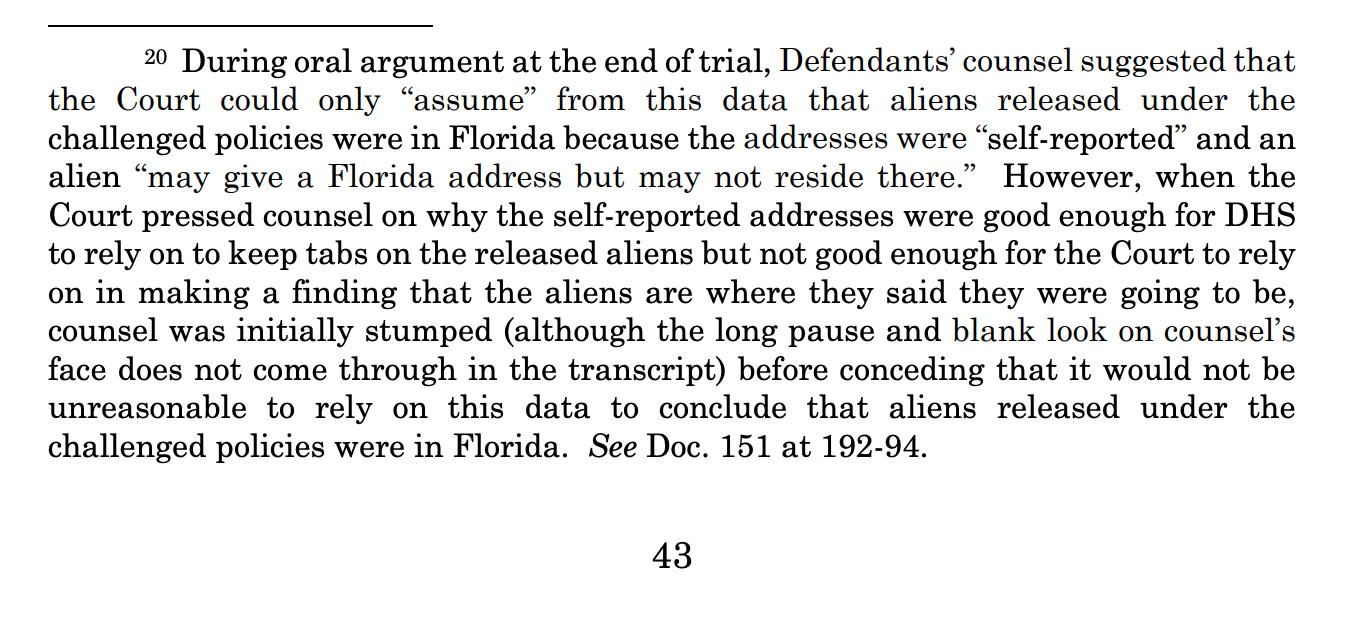U.S. District Judge T. Kent Wetherell wrote a "scathing" opinion in response to a lawsuit filed in March 2021 by Florida's Attorney General Ashley Moody. According to the press release, Wetherell ruled in State of Florida v. United States of America et al. that "Biden's catch-and-release policy is unlawful and gave the administration seven days to comply with federal immigration law."
AG Moody asked the Court to halt "the Biden administration's anti-deportation policies and hold Biden's actions and subsequent D.H.S. and I.C.E. memos unlawful." Wetherell ruled in favor of Florida, writing in his March 8 109-page ruling that the Biden administration has "effectively turned the southwest border into a meaningless line in the sand and little more than a speedbump for aliens flooding into the country."
Florida argues that Biden's Executive Order 13993, issued in Jan. 2021, opened the floodgates for the illegal entry of convicted criminals "including drug traffickers, sex offenders and those convicted of domestic violence," according to a March 2021 press release. Florida based its argument on evidence of "at least seven instances" of criminals not properly removed by I.C.E. after having been in state custody. These "convicts," wrote the state, "are in the country illegally and served prison sentences for burglary, cocaine trafficking, heroin trafficking, and other crimes."
Judge Wetherell's 109-page ruling concluded that there is indeed a crisis at the border that "shows no signs of abating." Wetherell clarifies that it is not the Court's job to "solve the immigration crisis," but it is the Court's job to ensure that "challenged policies comply with the immigration laws as written."
Congress, Not the President, Codifies Border Policies
Wetherell also correctly acknowledges that Congress, not the Executive Branch or the President, has "'complete and absolute power' over the subject of immigration and 'plenary power' over the admission and exclusion of aliens." The Immigration and Nationality Act (I.N.A.) codified the policies and procedures for the treatment of illegal aliens arriving at our borders. According to the ruling, Biden's border release policies violate the Administrative Procedure Act (A.P.A.). Per the Center for Immigration Studies (C.I.S.), "The [A.P.A.], which applies to all executive branch and independent agencies, prescribes procedures for agency rulemakings and adjudications, as well as standards for judicial review of final agency actions."
Congress cannot sue to enforce immigration policy. Therefore, Congress is left with the "power of the purse" —a power they rarely seem to use. As explained by C.I.S., that is why challenges like the one from Florida are so important.
 CIS/https://cis.org/Arthur/Federal-Judge-Vacates-Bidens-ParoleATD-Border-Release-Policy
CIS/https://cis.org/Arthur/Federal-Judge-Vacates-Bidens-ParoleATD-Border-Release-Policy
Parole+ATD: The July Memo
Judge Wetherell concurs with the state of Florida vis à vis the abuse of humanitarian parole (Parole+ATD) during the Biden administration. Parole+ATD stands for parole plus "alternatives for detention"—like "G.P.S. tracking, ankle monitors, or (more commonly) the SmartLINK app"—all "largely ineffective," according to C.I.S. UncoverDC reported in late January, and earlier columns, Biden's D.H.S. has effectively unlawfully retooled humanitarian parole for its own purposes. The humanitarian parole process allows illegal aliens to be released while they await immigration proceedings. However, humanitarian parole should be reserved for limited compelling cases only.
In FY2022 alone, according to C.I.S., "1.152 million-plus were processed for removal under the I.N.A." Most were not removed, and many were not even detained. These parole workarounds were brought online under the guise of COVID in 2021. When the Biden administration announced it would be removing Title 42 proceedings for illegal aliens in April 2022, Parole+ATD remained. Per a U.S. Immigration and Customs Enforcement (I.C.E.) memo, Parole+ATD was extended in July 2022. However, even in that very memo, I.C.E. admits the Secretary of Homeland Security only has the authority "temporarily...on a case-by-case basis" to parole certain individuals.
 Humanitarian Parole/July 2022 memo
Humanitarian Parole/July 2022 memo
Parole+ATD was allegedly designed and implemented to alleviate overcrowding in I.C.E. detention centers. The July Memo tries to make a case for Parole+ATD by stating that it is "60 minutes faster" and allows I.C.E. to supervise aliens better. It then notes that the process should still be used "sparingly." Judge Wetherell calls the Biden administration on the carpet for using the process more liberally than it should. Wetherell stated "projections" from the supplemental administrative record contain estimates that "the backlog created by Parole-ATD will take decades to overcome."
As Judge Wetherell points out in his ruling, "the July Memo expanded the eligibility for Parole+ATD to single adults rather than just family units" without explanation rendering the "July Memo arbitrary and capricious" because "the requirement that an agency provide reasoned explanation for its action would ordinarily demand that it display awareness that it is changing position." Fox Television, 556 U.S. at 515."
Wetherell ultimately agreed with 3 of the 5 arguments (arguments 1, 3, and 5) set forth by the state of Florida concerning the July Memo:
Referencing point number one, Judge Wetherell states the July Memo "failed to adequately consider the ever-worsening backlog caused by earlier iterations of the policy." Referencing number 3, Wetherell writes the July Memo ignored evidence "when it concluded that Parole+ATD will only be 'used sparingly'" but, in fact, it became a "primary processing tool." According to the ruling, evidence shows that in the month before the July memo, "C.B.P. released over 40,000 applicants for admission under that policy, which was more than 40% of total apprehensions at the Southwest Border that month. And that was before the July Memo expanded eligibility for Parole+ATD to single adults."
In reference to point number five, Judge Wetherell argues the July Memo also "failed to acknowledge its decision to expand Parole+ATD to include single adults" and never explained why it did. The state of Florida also argued the July Memo also failed to follow notice and comment guidelines. Judge Wetherell concurred and ultimately concluded the July Memo is "contrary to the law."
 July Memo/Wetherell
July Memo/Wetherell
Judge Wetherell Says Databases on Criminal Aliens Often Not Shared from Home Countries
The government tried to argue that "its parole release policies conform with the regulation implementing the parole statute, 8 C.F.R. § 212.5. It allows D.H.S. to parole 'aliens whose continued detention is not in the public interest,'" as explained by C.I.S. However, Judge Wetherell destroyed the argument by noting the regulation "flips I.N.A. on its head." Notably, Florida did not challenge the regulation, but the judge did. C.I.S. writes:
"Specifically, he held, the parole statute requires detention unless parole is justified based on 'urgent humanitarian reasons' or 'significant public benefit'" while the regulation effectively allows any alien to be released on parole whenever continued detention is not 'in the public interest'—whatever that means—and the 'alien is not a security or flight risk.'
With respect to that security risk assessment, the Court critically noted the record failed to show how C.B.P. officers could determine whether an alien posed such a risk 'if the alien's home country does not share its criminal history databases with the United States.'"
Wetherell ultimately ruled the Parole+ATD Policy should be "vacated under A.P.A." and remanded to the D.H.S. for "further proceedings consistent with the Opinion and Order entered on this date."
An interesting footnote in the document (footnote 20) speaks to the reliance of D.H.S. on "self-reported" addresses by "aliens released under the challenged policies." The government attempted to argue from both sides of its mouth until Judge Wetherall challenged its logic.
Florida estimated it had spent "millions of dollars in public funds" on aliens in the state because of Biden's border policies. However, the government tried to argue that Florida could not prove that they were being materially impacted financially by an influx of illegal aliens. The government argued "the Court could only assume from [D.H.S.] data" that "an alien" was actually in the state because the data was "self-reported." Judge Wetherell swiftly poked holes in the government's logic by telling the government that what's good for the goose (the D.H.S.) should be good for the gander (the Court). In other words, if the self-reported addresses are good enough for the D.H.S., notes the judge, they should be good enough for the government. Florida argued that "well over 100,000 aliens" ended up in Florida "under the challenged policies."
 Footnote 20/Page 43/http://myfloridalegal.com/webfiles.nsf/WF/GPEY-CPQPAB/$file/final+order.pdf
Footnote 20/Page 43/http://myfloridalegal.com/webfiles.nsf/WF/GPEY-CPQPAB/$file/final+order.pdf
Notably, as mentioned by the Charlotte Observer, "[t]he ruling does not impact a different parole program Biden announced last year that would allow 360,000 people a year from Cuba, Haiti, Nicaragua, and Venezuela to legally enter the U.S. if they have a financial supporter in the U.S., and both pass a background check." Ukrainians and Afghanis also benefit from similar exceptions to detention from the U.S. government.


